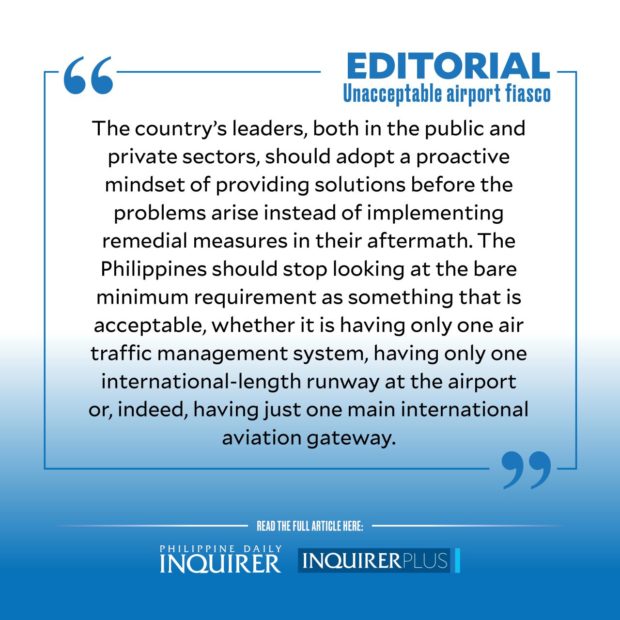Unacceptable airport fiasco
There are no two ways about it: The complete collapse of the country’s air traffic control system on New Year’s Day during the busiest travel season of the year can only be described as a fiasco.
Not only did it inconvenience tens of thousands of airline passengers—both foreign and local—who were flying to, from, and within the Philippines on the very first day of 2023, but it also endangered the lives of thousands more who were already in the air over the nation’s airspace, including those flying in aircraft that were merely passing through to another destination.
Simply put, what happened was the aviation equivalent of traffic lights all over the country going out all at once. Only, instead of vehicles getting into traffic jams on land, the failure of the P10.8-billion Philippine Air Traffic Management System resulted in aircraft hurtling through the skies without the guidance from ground controllers necessary for them to maintain traffic rules thousands of feet up in the air.
It is unfortunate that the incident caused additional stress to travelers flying on what was already the heaviest period at many airports in three years. But we should consider ourselves lucky that the shutdown caused no accidents and resulted in no casualties.
Authorities are pointing to a power outage that caused the computer systems of air traffic controllers—basically the traffic cops of the skies—to crash mid-morning, and remain down despite several attempts to reboot it well into the afternoon. Officials of the Department of Transportation, which oversees the Civil Aviation Authority of the Philippines, also explained that the backup power for the system failed to kick in as it was supposed to. And when it was restarted, it did so only in a limited capacity. Speculation was also rife that the system’s failure may have been caused by computer hackers (something authorities were unable to rule out in the early stages), or even a malicious attempt to embarrass the leadership of the department who has been shaking things up the status quo in various agencies under his supervision.
But whichever of these is the true reason for the fiasco, none of them are acceptable.
It is simply unacceptable that critical elements of the country’s aviation infrastructure like navigation radars of traffic management systems can fail—along with their backup systems—and inconvenience thousands and put the lives of thousands more in danger.
It is unacceptable that are no redundant systems like radars or facilities strategically placed in the Visayas or Mindanao, which can be activated in the event that facilities in Luzon go down. For a country that prides itself with providing 24/7 call center and business process outsourcing services to the rest of the world in an uninterrupted fashion even during natural and man-made calamities (that’s to back up systems and multiple redundancies), it is unimaginable that such a mindset has not permeated to the leaders of the public sector.
Naturally, the temptation is strong to start pointing fingers at officials past or present who may have contributed to this embarrassing debacle. The failure goes back many years, no thanks to delayed and slow procurement processes that practically ensured that the new system was already obsolete by the time it was installed. But it is also a failure of its current managers who failed to validate that backup systems and contingencies were ready to be activated when needed. So making officials accountable is important.
But what’s more important going forward—and far more difficult than simply criticizing and assigning blame—is to make sure that such a farce is not repeated. And for this to happen, the country’s leaders, both in the public and private sectors, should adopt a proactive mindset of providing solutions before the problems arise instead of implementing remedial measures in their aftermath.
The Philippines should stop looking at the bare minimum requirement as something that is acceptable, whether it is having only one air traffic management system, having only one international-length runway at the airport or, indeed, having just one main international aviation gateway. The same mindset of preparing redundancies and backup systems should also be applied to critical infrastructure across the nation like power plants, electricity grids, telecommunication systems, and sea and land transport.
Changing our collective frame of thinking from our long accustomed remedial mindset to one of perpetual preparedness will take time, energy, resources, and a great deal of political will on the part of our leaders. But the alternative is the loss of thousands of productive man-hours and even, knock on wood, human life and limb. For that reason, the New Year’s Day fiasco should never happen again.
















